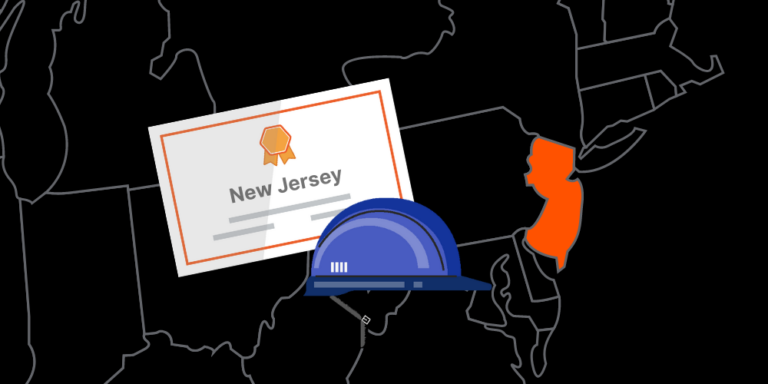— 6 min read
New Jersey Contractor Licensing Guide
Last Updated Jan 30, 2025
Last Updated Jan 30, 2025

If you're starting a construction business in New Jersey, one of the first steps is familiarizing yourself with New Jersey contractor licensing requirements.
New Jersey refers to general contractors as "home repair contractors," and they are required to carry a license issued by the New Jersey Department of Banking and Insurance (DOBI). Plumbing, electrical, and HVAC mechanical contractors also have to carry licenses to contract within New Jersey.
This guide can help you sort through the New Jersey contractor licensing requirements and get to work running or expanding your business.
Table of contents
How to get a contractor license in New Jersey
Many contractors in New Jersey need a license, though the requirements and process vary slightly depending on the type of license you need: home improvement contractor license, plumbing contractor, electrical contractor, or HVAC contractor.
Any contractor who sells or makes improvements to homes or non-commercial properties in New
Jersey must register with the state’s Division of Consumer Affairs— regardless of whether the contractor is based in New Jersey or another state.
Working in another state? Check out The Ultimate Guide to Contractors License Requirements in Every State.
How to get a general contractor license in New Jersey
New Jersey refers to general contractors as "home improvement contractors" or "home building contractors." The state doesn’t require these contractors to carry a license — with one exception that will be covered below.
Home improvement contractors have to register their businesses with the state’s Division of Consumer Affairs, just like any other business in New Jersey. Home building contractors need to register their businesses with the Department of Community Affairs. If you're applying for the first time, you will need to carefully read and fill out this home improvement application packet and pay a $110 application fee.
But, if a home improvement or home building contractor deals in financed repairs with payment schedules of more than 90 days, they will also have to apply for a license from the New Jersey Department of Banking and Insurance.
Courses about construction.
For construction.
Unlock your career potential with our free educational courses on Health & Safety, Data in Construction, and more.
New Jersey commercial contractor licensing
According to the Division of Consumer Affairs, the statewide contractor registration act of 2006 does not apply to contractors who work exclusively on commercial property. Quote:
However, some individual municipalities, including Newark, Passaic, and Atlantic City have licensing requirements for commercial contractors. Always check with the local government anywhere you plan to work for the most up-to-date information.
How to get a plumbing contractor license in New Jersey
Unlike other states, there is no contractor license for plumbers in New Jersey. However, to operate legally as a plumbing contractor, a licensed master plumber must own at least 10 percent of the company.
Master plumber licensing is a matter of the NJ Department of Consumer Affairs. To apply for a license, an applicant must meet these requirements:
- Be 21 years old or older
- Has completed a four-year apprenticeship program approved by the United States Department of Labor and has completed one year of practical hands-on experience as a journeyman plumber; or
- Has been awarded a bachelor’s degree in mechanical, plumbing, or sanitary engineering from a college or university accredited by a regional accreditation agency recognized by the Council on Post-Secondary Accreditation or the United States Department of Education, and has completed one year of practical hands-on experience as a journeyman plumber.
Once those requirements are in the bag, the would-be contractor will fill out the correct application for the work you are doing on this page, pay the $100 application fee, and take an exam. New Jersey also supplies a succinct PowerPoint that overviews the process for Master Plumbers in full.
How to get an electrical contractor license in New Jersey
Opposite of the plumbing regulations, electrical contractors in New Jersey do need to carry both a trade license and a contractor license. Both of these licenses go through the Division of Consumer Affairs.
Before a contractor can go into business for themselves, they must hold a journeyman’s license and meet these requirements taken directly from the Consumer Affairs’ website:
- Be over age 21
- Immediate five years experience working with tools, installation, alteration, and repair of wiring for electrical light, heat, or power in compliance with NEC code. This time can not be spent supervising, engineering, estimating, or managerial task. Alternatively, the applicant may satisfy the above experience by having;
Once you meet all those requirements, you can create a login and apply through Consumer Affairs.
How to get an HVAC contractor license in New Jersey
To operate as an HVAC contractor in New Jersey, prospective contractors must hold a master contractor’s license issued by the Division of Consumer Affairs.
The requirements, taken directly from the Consumer Affairs’ website are as follows:
- The person shall be 21 or more years of age and a citizen or legal resident of the United States and shall have been employed in the HVACR contracting business for a period of five years next preceding the date of his application for a license.
- In lieu of the above requirements a person shall have been awarded a bachelor's degree: a. in HVACR technology from an accredited college or university in the United States which the board finds acceptable and, in addition, shall have been engaged or employed in the practical work of installing HVACR systems for one year; or b. from an accredited college or university in the United States which the board finds acceptable and, in addition, shall have been engaged or employed in the direct supervision of the installation of HVACR systems for three years.
Contractors must submit these applications online, along with electronic forms of any documentation required.
Penalties for unlicensed and unregistered work
Registration is pretty universal in New Jersey, so it makes sense that the state would have some strict penalties for working while unregistered.
The penalty for working without registering is a civil penalty of up to $10,000 for the first offense and $20,000 for each subsequent offense. There can also be criminal charges and additional fees.
It’s never a good idea to contract for work requiring a license if you don’t hold that license. It can open your business up to many liability issues, fines, and penalties.
Learn the licensing rules in nearby states
Was this article helpful?
Thank you for your submission.
90%
10%
You voted that this article was . Was this a mistake? If so, change your vote here.
Scroll less, learn more about construction.
Subscribe to The Blueprint, Procore’s construction newsletter, to get content from industry experts delivered straight to your inbox.
By clicking this button, you agree to our Privacy Notice and Terms of Service.
Categories:
Tags:
Written by
Tom Scalisi
57 articles
Tom Scalisi is a writer with over 15 years of experience in the trades. He is passionate about educating contractors and specialty contractors about the best practices in the industry. He has seen first-hand how education, communication, and preparation help construction professionals overcome challenges to build a strong career and thriving business in the industry.
View profileExplore more helpful resources

Contractor License Bonds: Everything You Need to Know
In order to perform construction work, many states require contractors to be “licensed and bonded.” What does that mean? Well, every state sets its own rules for contractor licensing, and...

Contractor’s Guide to License Reciprocity: Working Across State Lines
For many contractors, growing a construction business means taking on jobs in different states. Whether it’s to take a one-off project or to establish a new business location, working in...

Vermont Contractor License: Guide to Rules & Requirements
If you’re starting a construction business in Vermont or looking to expand your business from another state, being properly licensed to work is one of the first key steps. There...

The Maine Contractor License: Guide to Rules & Requirements
If you’re considering starting a contracting business in Maine, it’s important to know the rules and requirements for proper licensing. Maine takes a different approach to contractor licensing than most...